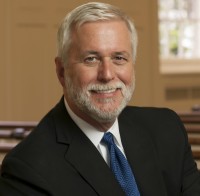Funerals make me miss being a parish pastor
Standing at the graveside with the last lingering family members, time seems thick.

Over five years ago I came to work for Princeton Seminary after spending 32 years as a parish pastor. One of the questions I frequently receive is “Do you miss serving a congregation?”
I love serving our seminary and am absolutely devoted to its mission. But of course, there are some aspects of being a parish pastor that I miss. By far, what I miss most are the funerals.
It surprises people when I say that, and it’s actually been a surprise to me as well. But as much as I enjoyed my years as a parish pastor, the funerals are the only thing that have ever tempted me to look over my shoulder at the decision to leave congregational ministry.
I don’t miss the evening committee meetings that can last too long and accomplish too little. I don’t miss the small-time politics, the denominational bureaucracy, or the grumpy members who were never going to be happy but who just wouldn’t leave the church. But being with someone through the process of dying, offering compassion to the family as they place their loved one into God’s arms, conducting the funeral, and working through the grief—it’s the purest form of pastoral ministry I know.
Read our latest issue or browse back issues.
Like most seminarians I used to think that when I became a pastor I would love officiating at weddings and somehow get through the funerals, too. And like most veteran pastors I would now say just the opposite. Weddings can be glorious experiences of worship, but usually they have way too many layers of planning and expectations for anyone to be able to focus on holy words. Mostly what people want from the minister is to get through the service as elegantly and quickly as possible.
At a funeral no one is thinking about the bride’s gown, the flowers, how cute the ring bearer is in his little tuxedo, or how much this thing is costing. Best of all, funerals don’t have photographers. But frequently they do have caskets, which have a way of riveting the congregation’s attention. And the music is soulful. So when a pastor goes to the pulpit, people are ready to listen. They’re thinking about important matters of life and death. My job was to help them also think about the resurrection to eternal life. What could be more central to the gospel I vowed to proclaim?
We don’t know if Jesus had a good time at the wedding in Cana, but it is clear that he helped the party by turning water into wine. That’s essentially the pastor’s job at weddings—trying to help those who are knocking themselves out to have an extraordinary day. So I would always happily go for the ride at weddings, do my part, and enjoy what may be the most beautiful day for the couple before me at the altar.
By contrast, we do know that Jesus had serious work to do when he went to the tomb where Lazarus was being mourned. Maybe that’s why something rises in the soul of a pastor who has the high honor of speaking over the casket to proclaim there is more than this. There is a Savior who calls us to come forth from the places of death.
As much as I miss being a part of such death-defying proclamation during the funeral service, I think the moment I miss most of all is standing with a few family members at the graveside after all the words are done and everyone else is returning to the cars. This is when the time seems most thick. I have already said all that I know the gospel says, in the sanctuary and at the graveside. Now we just stand there, silently staring at the dirt to which we will all eventually return. Something extraordinary happens in that holy moment.
The family and I have been through a lot together since the night I first rushed to the hospital. And we know their journey through the grief is really just beginning. But in that silent moment, a pastor and the few people who miss the deceased the most now realize we’re being knit together. Even if they are struggling to believe everything I said at the funeral, they at least believe that I believe, and they know they’re free to lean on that. And even if they have no idea how they will get by without this one they’re about to leave in the grave, they know they can always describe the aching loneliness to their pastor.
When we walk back to the waiting car, often hand in arm, they will be sure to invite me again to come back to the house where they’re hosting a small reception for friends. I know the scene so well. No one will care about the food, but some will be fussing over the table just to have something to do. Throughout the house there will be various quiet conversations among two or three people who may tell a story about the deceased. Others will seek reassurances from me that the family is going to be OK. Still others will just sit silently on the sofa.
It’s easy to mistake this as an awkward scene. It’s certainly not easy or comfortable. But that’s because everyone is walking around with their souls exposed. And that’s the kind of place where pastors are most at home. Yes, I do miss that.
A version of this article appears in the print edition under the title “I miss funerals.”






